by Pinchas Cohen
Key Events
US equities finished yesterday mixed, even as the much vaunted promise of a tax overhaul proceeds toward full Congressional debate. This ambivalent reaction to what should have been one of the biggest fundamental drivers of the year for equity markets echoes how currency markets have been treating the dollar, as discussed yesterday.
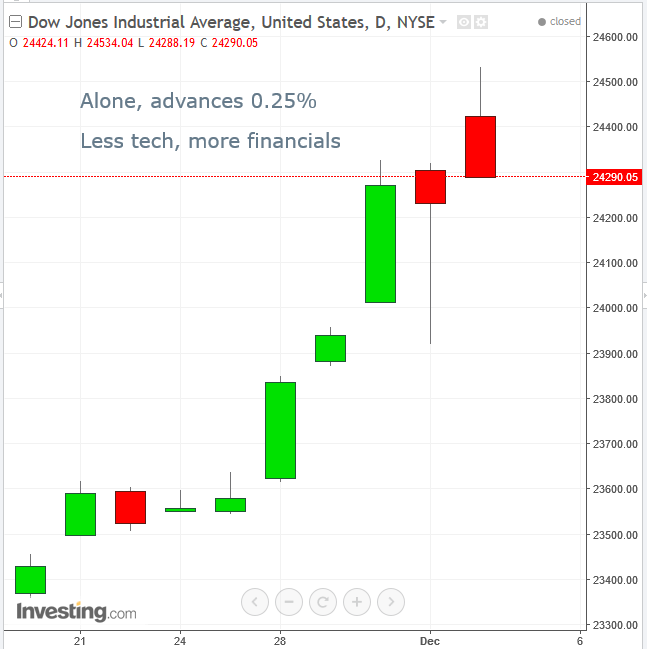
All four major US indices—including the S&P 500, NASDAQ and the Russell 2000—trimmed intraday gains by the close. The Dow Jones Industrial Average was the only major index to finish higher for the day. This resumes the trend for the blue-chip index which saw the biggest gains among US indices for the previous week.
Global Financial Affairs
Yesterday's sell-off was led by Technology stocks, which have been most affected by the anticipated corporate tax cuts, since tech companies are expected to see no benefit from the legislation, which as currently written reduces corporate taxes to 20 percent. The tech industry’s average effective rate is already lower, at 18.5 percent, thanks to loopholes that offer considerable leeway in how they report profits.
In a mirror image of the 1.61 percent tech sell-off that led averages lower, Financials were the biggest winners yesterday, climbing 1.52 percent. In contrast to tech companies, financial firms pay the highest effective tax rate of 27.5 percent, according to a Wells Fargo analysis of historical tax rates, making financial shares the biggest beneficiaries of the proposed corporate tax cuts.
An additional tech sector disadvantage: it now offers negative relative value since it's the biggest sector advancer this year, even after the sell-off, with a 32.01 YTD gain, more than double that of financials, with a 15.61 YTD advance.
This may also help explain why the DJIA has been outperforming the S&P. The Dow, an index of the 30 largest US stocks, has a heftier weighting in financials versus the SPX, 15.98 percent versus 14.54 percent respectively. As well, the Dow has a smaller technology weighting than the S&P 500, which effectively protects it from the recent tech declines: 19.26 percent versus the S&P 500's 22.25 percent for information technology + another 2.14 percent for telecommunication stocks.
Along with large cap financials, the biggest beneficiaries of the tax cut proposals are considered to be small cap companies (which have fewer opportunities and resources with which to take advantage of legal loopholes available to larger companies).
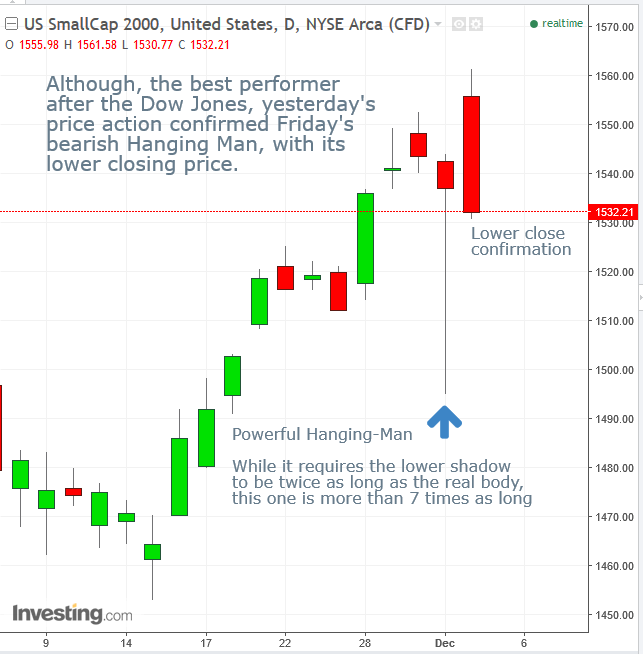
That could explain why, after the Dow, the small cap Russell 2000 outperformed the other indices with the smallest loss, just 0.08 percent.
Today in Asia the technology sell-off continued. Chinese shares, both on the mainland via the Shanghai Composite as well as in Hong Kong on the Hang Seng, dropped despite a report indicating the sector expanded at a faster rate in November than in October.
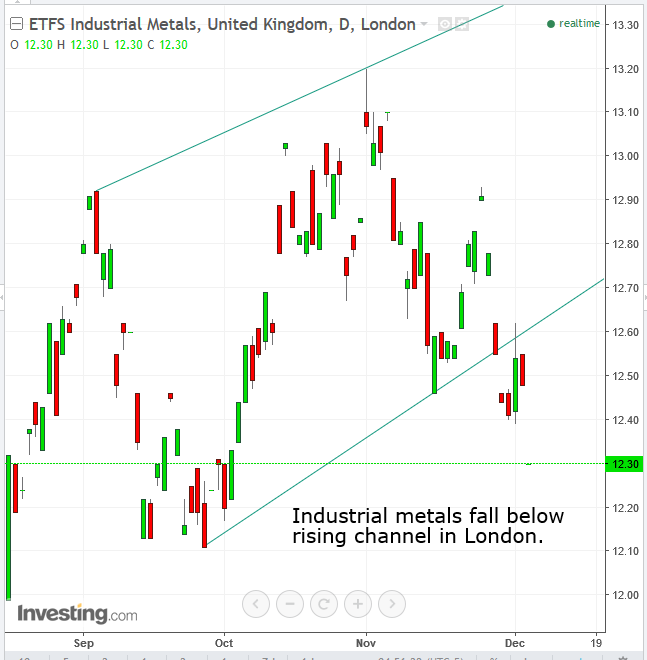
Investors continued to rotate out of technology shares in Europe too, as the Stoxx Europe 600 meandered, compounded by an extended decline in Industrial metals, weighing down on mining shares.
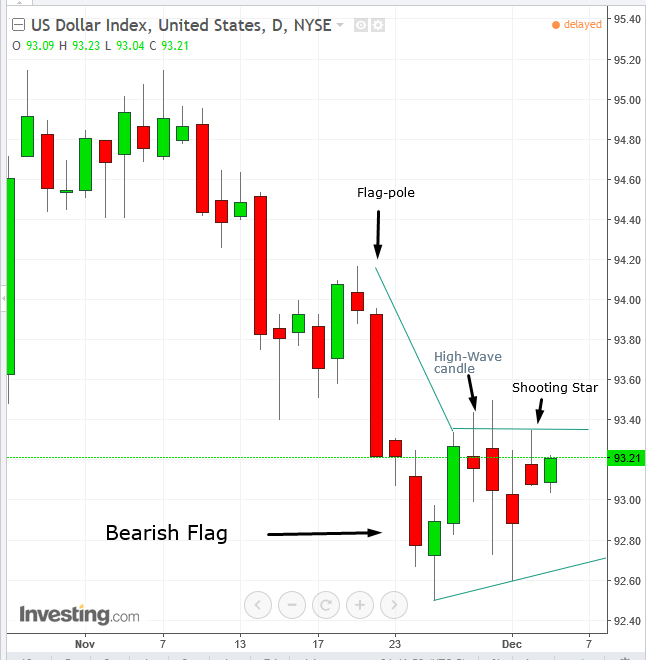
The dollar held on to its gains from yesterday, pressuring the price of oil, which extended losses below $58 a barrel, ahead of US government data forecast to show crude stockpiles fell for a third straight week.
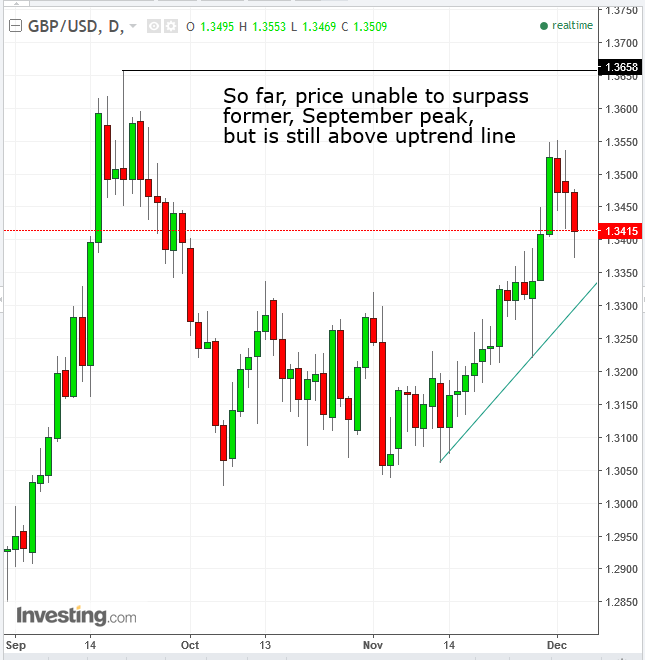
The pound slipped after progress on the current phase of Brexit negotiations once again fell apart yesterday, on Irish border differences. The talks are scheduled to resume later this week.
The Australian dollar jumped to a more than three-week high, driven by better than expected retail sales data and positive comments on inflation from the RBA.
We may continue to see the recent rotation out of technology stocks and into financial shares extend—along with a restrengthened dollar—as Congress begins working to merge the House and Senate tax reform bills, before submitting a final, integrated version to President Donald Trump, forecast to occur before the end of the year.
Up Ahead
- The European Commission College of Commissioners discusses Brexit on Wednesday and will likely make its recommendation on whether sufficient progress has been made to move negotiations forward to the next phase.
- The U.S. faces a partial government shutdown Thursday, after funding runs out on December 8 if Congress can’t agree on a spending bill by then.
- U.S. employers probably hired at a robust pace in November as the unemployment rate held at an almost 17-year low. The Labor Department’s jobs report, released on Friday, may also show a bump up in average hourly earnings.
- Countries setting monetary policy this week include Brazil, Canada, and Poland.
Market Moves
Stocks
- The Stoxx Europe 600 Index was unchanged as of 8:35 London time (3:35 EDT).
- The MSCI All-Country World Equity Index ticked down less than 0.05 percent.
- The U.K.’s FTSE 100 jumped 0.4 percent.
- Germany’s DAX increased 0.2 percent to the highest in two weeks.
- The MSCI Emerging Markets Index sank 0.4 percent.
- S&P 500 Futures climbed 0.1 percent.
Currencies
- The Dollar Index gained 0.18 percent.
- The euro fell 0.1 percent to $1.1851.
- The British pound declined 0.7 percent to $1.339, the weakest in a week on the largest fall in more than a month.
- The Japanese yen decreased 0.2 percent to 112.59 per dollar, the weakest in more than two weeks.
Bonds
- The yield on 10-year Treasuries rose one basis point to 2.37 percent.
- Germany’s 10-year yield climbed four basis points to 0.34 percent.
- Britain’s 10-year yield increased six basis points to 1.28 percent.
Commodities
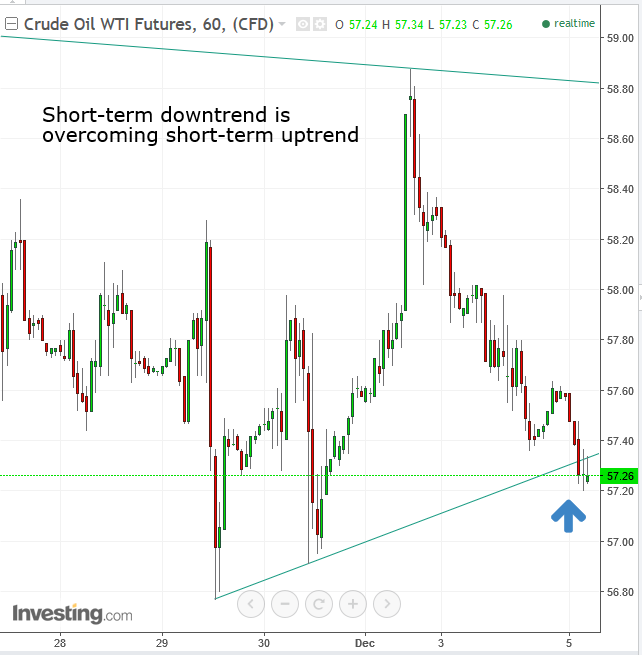
- West Texas Intermediate crude decreased 1.6 percent to $57.40 a barrel. Post the extended OPEC production cuts, prices continue to slide. Plus, it's clear that not all producers stand to gain from the deal.
- Gold fell 0.3 percent to $1,278.80 an ounce.
